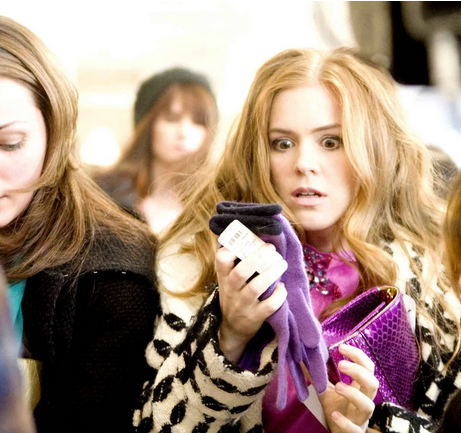9 Helpful Questions to Ask Yourself Before You Buy Something New
When I buy something new, it really has to pass the test. By test I mean the new standard I’ve set for myself since KonMari-ing my home nearly five years ago. We invested so much time going through every single item that we owned and although our goal was to create our sanctuary - a place where the items were in harmony with their environment - what we didn’t anticipate was the complete change of mindset we’d have when it came to buying anything new.
My clothes are all in one place… Goodbye storing items in suitcases each season!
That’s what happens when you go through the tidying process. It’s an audit of the contents of your home. A reset. And once you’ve determined what stays, you can become very protective of what comes into your home in the future. We don’t always have full control here; well-meaning relatives and friends can still buy us unwanted gifts that threaten to throw off balance the haven we’ve created for ourselves. What we do have full control over however is our own shopping habits. I have to be honest, as a self confessed shopaholic a decade ago, I still find it hard to believe how I’ve managed to change my ways so dramatically. I used to be the girl who stored her winter wardrobe in two suitcases when it was summer, only to swap over the contents every time the seasons changed. I shudder when I think of all of that time I wasted!
KonMari organisation creates a mental imprint that you conjure up when tempted to buy something new…
What are my shopping habits like now I hear you ask?… Well, I rarely shop (although this may be due to the fact that I have two small children). When I window shop, I enjoy the experience but I don’t get ‘pulled in’ like I used too. I’m suspicious of sale signs and greenwashing initiatives. Shopping is much more intentional for me now. If I identify something new that I would like in my life, purchasing that item (as well as researching 20 other alternatives) becomes a joyful experience. It’s an experience that cannot be rushed. I could write a whole series of blog posts about my new shopping habits but today I would like to share 9 questions I teach my clients to ask themselves - as they’re going through their own KonMari tidying festival - to practice the skill of becoming a conscious consumer. Just a heads up, the questions go much further than ‘Does this item spark joy?’:
Is this item a need or want?
Will this item help me to live a better life?
Do I actually need this? Before you hand over your credit card (or complete the swipe to the left / click ‘buy’), take a moment to pause and ask whether this item is fulfilling a genuine need in your life right now, or whether it’s satisfying an urge you have. Are you craving a hit of dopamine because you’ve had a stressful day? Do you want the item just because…? Sometimes we can convince ourselves we are buying something we need when it is really just a want.
Does it suit my needs at this moment in time? For example, can you fit into the item right now? There’s no point buying something to motivate you to lose that lockdown weight; invest the money in an exercise class instead. When it comes to books, ask yourself if the content of the book you’re considering buying will serve you this week (the best time to read a book is within one week of purchasing it; outside of this time frame, the likelihood you’ll ever read it diminishes radically over time). Only purchase items that will serve you right now.
Do I have something similar? When it comes to this question, I always remind my clients to picture their home environment and how this new item will fit in with what’s currently there. If you’ve already completed your joy checks on clothing, do you have an item that is very similar to the one you’re considering buying? Through KonMari, we organise our items so we can see them at a glance. This becomes a mental picture that we conjure up whenever we’re tempted to buy something new and so the story goes: ‘I’ve got three black t-shirts in my third dresser drawer… they’re all in good condition and fulfill different purposes… does this other black t-shirt deserve a space next to the others I’ve decided to keep?’ If you already have duplicate items, chances are you can leave the item at the store. You already have exactly what you need.
Can I borrow this item, rent it or buy it second hand? If you need something new for a one off project like a drill or kitchen appliance, ask around to check if you can borrow one from a neighbour, friend or family member. You can also check your local free cycle, Facebook Marketplace or charity shop for more affordable options. If you can’t find what you need then look into buying it new. It pays to do a little bit of research first.
Will I get a lot of use out of this item? I truly believe in quality over quantity. Yes, in the olden pre-KonMari days I would buy 5 pairs of summer shoes for £30 in Primark but what I learnt was that they only last one summer (if that). Now I see the value in owning less, one pair of good quality summer shoes does a better job than the 5 I used to ‘invest in’ before (and they last much longer too!). Bargains aren’t really bargains are they? Are you going to buy a dress to wear to a wedding and never wear it again? Maybe it would be better to hire a dress instead and save yourself the money. Are you buying a pair of shoes that will only go with an outfit in your wardrobe which will be out of style in a few months? Leave them in the shop and seek out a ‘classic’ that you can use again and again.
Is this just an impulse decision? If you’re feeling low, don’t shop. If you’re feeling anxious, don’t shop. If you’re feeling tired or overwhelmed, don’t shop. Purchasing something new should be a planned, intentional decision. Something we get excited about. I read recently that the most happiest and fulfilling memories have three parts. The first is the anticipation we feel as we prepare for the event. The second part is the event itself. The third part is remembering the event with gratitude and joy. When we buy something on impulse, we skip part one and go full steam ahead to part two. And when it comes to part three, often impulse buys come with a huge dose of guilt. I’ve seen it so many times with my clients; when they come across impulse buys, their immediate reaction is: ‘This was a mistake. I never should have bought this.’
Is this the one? This is a question I think about a lot whenever I’m buying something new. I have a very specific joy criteria because of all of my previous efforts in letting go of everything that no longer serve me in my life. All the things I now buy are in line with my vision of my ideal lifestyle and my ideal living environment. Something has to be the one to deserve permanent residence in my home. This means that I joyfully engage in extensive research before buying anything. There are so many options available so I research to make an informed choice. There’s nothing worse than investing in something only to realise there’s a better alternative elsewhere. Research until you find the one. The one that deserves a place in your life (and home). Then make the buying experience a joyful event.
BEWARE THE SALE ITEM: If the item was full price would I still buy it? My mum bought everything in the sale. I mean everything. So many of my clients find themselves drowning in clutter because they fall prey to the ‘sale’, the ‘bargain basket’ or the ‘BOGOF’ (buy one get one free). Sale items are extremely tempting because we feel like we’re getting a good deal. This is an opportunity not to be missed. But these items are in the sale for a reason. The shop is trying to get rid of them. Get rid of surplus stock to make way for something new. So ask yourself: '‘would you be willing to pay full price for this item?’ If the answer is no, then walk away. Sometimes we are pulled into making purchase decisions by the sale price and we lose our ability to see something exclusive of the bargain that it may be.
Do I want to maintain and take care of this item? Let’s face it, some items are high maintenance. They have to be washed a certain way. Air dried upside down. Dry-cleaned. Hand washed. Treated every few months with oil etc. It may seem like common sense (but believe me, it’s not common practice) but read the labels and instructions on an item before you buy it. This is all part of becoming an informed and conscious consumer. If you get stressed out at the thought of looking after the item once it’s in your home, you will probably never use it. It’s ok not to buy something because you can’t look after it. After all, a dog isn’t just for Christmas…
Refining our shopping habits takes time and a great deal of effort. Trust me, I still love shopping (when I have the opportunity!) but I also derive a great sense of satisfaction from being fully in control of my consumerism. And it’s a positive habit that builds and builds. If you’re trying to become more mindful in your shopping habits, I’d love to hear which of the above questions you think you’d use in the future. If you have any additional questions that currently work for you, please feel free to share them in the comments below.
Katrina x





